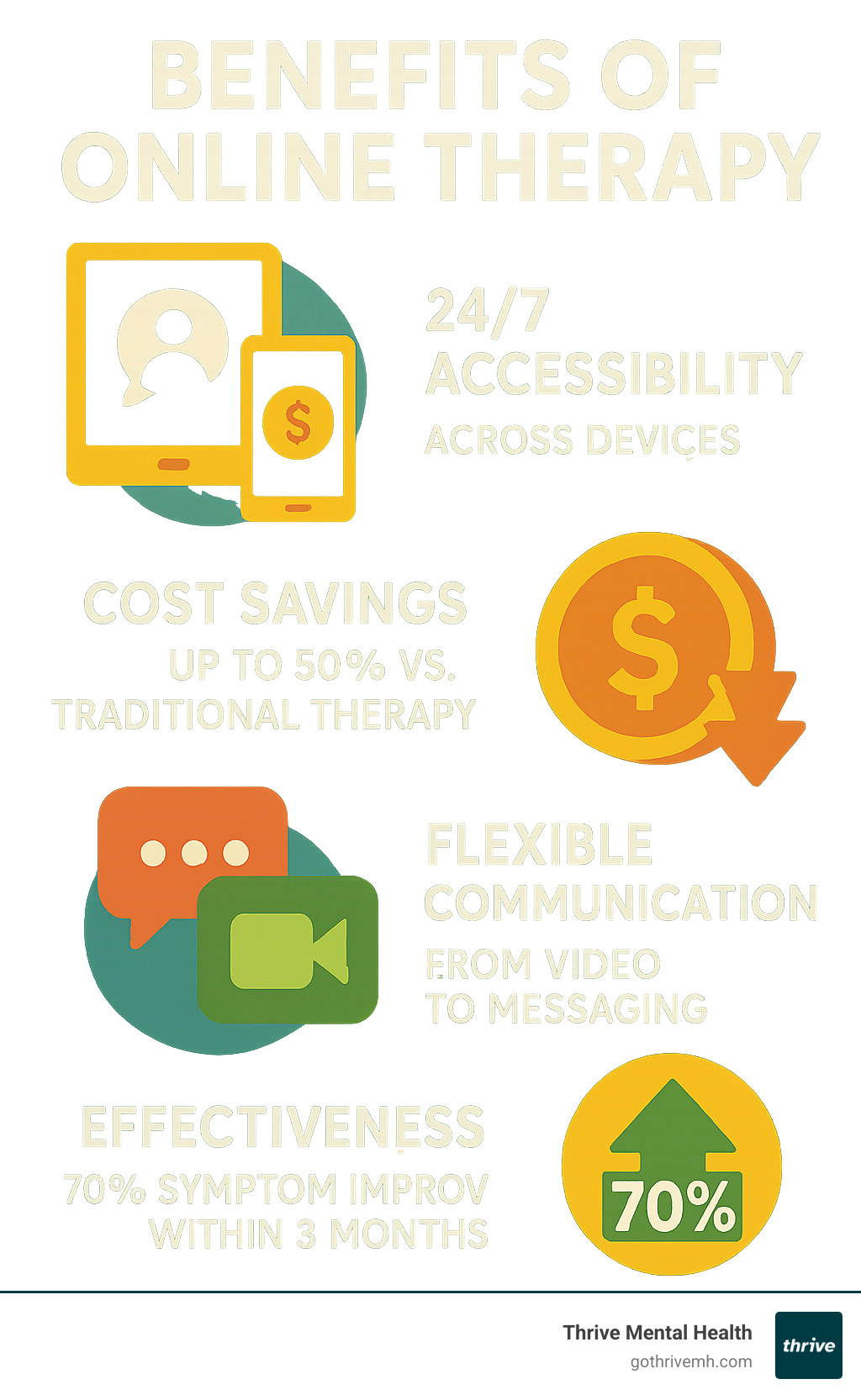Therapy at Your Fingertips: Exploring Online Options

Therapy at Your Fingertips: Exploring Online Therapy Options [2025]
If youre in crisis or having thoughts of self-harm, call or text 988 immediately. You are not alone.
Why Online Therapy is Changing Mental Health Care
Online therapy options are reshaping access to care8% of people say its more convenient than traditional therapy, and research shows strong outcomes for anxiety and depression. With secure video, messaging, and hybrid models, virtual care meets you where you are. Learn more about the evolution of care in telepsychology.
Summary: The best online therapy options offer flexible formats (video, phone, messaging), proven effectiveness, and streamlined accessideal for busy professionals and anyone seeking high-quality, privacy-first support.
Quick Overview: Top Online Therapy Options
- Video Sessions: Live therapy through secure video calls.
- Messaging Therapy: Text-based communication with licensed therapists.
- Phone Sessions: Audio-only for comfort or low bandwidth.
- Self-Guided Programs: Tools and worksheets between sessions.
- Hybrid Models: Live sessions plus digital resources.
Studies show that 70% of people see improvement in anxiety or depression within three months, and 80% say online care is as effective as in-person. At Thrive Mental Health, weve seen digital platforms break down barriers and help clients get timely, expert-led support that fits real life.

Terms related to online therapy options:
What Are the Different Types of Online Therapy Available?
When exploring online therapy options, you’ll find a rich landscape of services designed to meet your unique needs. The beauty of digital mental health care lies in its flexibility, with formats and support types for every lifestyle.

Communication Formats
The way you connect with your therapist can make all the difference. Common formats include:
- Video Conferencing: This format feels most like traditional therapy, allowing for real-time interaction and visual cues in sessions that typically last 45-60 minutes.
- Asynchronous Messaging: A flexible option where you can send text, voice, or video messages to your therapist anytime. They typically respond once or twice daily, which is ideal for those who need time to process thoughts or have unpredictable schedules.
- Phone Sessions: A great middle ground if you’re uncomfortable on video or have a poor internet connection, allowing you to focus on the conversation without visual distractions.
- Hybrid Models: Many platforms, including Thrive Mental Health, combine live sessions with digital resources. Our Virtual Intensive Outpatient Programs blend different formats to meet changing needs.
Types of Therapeutic Support
Beyond communication, online therapy varies in focus and structure:
- Individual Therapy: The most common choice for one-on-one support for anxiety, depression, and life transitions.
- Couples & Group Therapy: Digital formats have adapted well for couples counseling and for group sessions that foster community among people with similar challenges.
- Specialized & Intensive Care: For younger clients, Virtual Counseling for Teens addresses adolescent challenges. For those needing more than weekly sessions, Virtual Intensive Outpatient Programs (IOP) and Partial Hospitalization Programs (PHP) offer comprehensive support, including specialized treatments like EMDR Therapy.
Therapeutic Approaches Available Online
Effective therapeutic methods are widely available online. Cognitive Behavioral Therapy (CBT) is excellent for digital formats, helping you reshape negative thought patterns. Dialectical Behavior Therapy (DBT) teaches emotional regulation skills, which is also well-suited for virtual delivery. The variety in online therapy options means you’re no longer limited by geography and can find specialized care that fits your needs.
The Pros and Cons of Choosing Online Therapy
When considering online therapy options, it’s important to weigh the significant benefits against the potential drawbacks to decide if it’s the right fit for you.
Key Benefits: Convenience, Access, and Effectiveness
Digital platforms are breaking down long-standing barriers to mental health care.
- Convenience and Accessibility: Online therapy eliminates commutes and scheduling hassles. It’s a game-changer for those in rural areas, with mobility challenges, or with demanding schedules. 98% of users find it more convenient than in-person therapy.
- Wider Therapist Selection: You are no longer limited to your zip code. Online platforms give you access to a wider pool of licensed professionals across your state, increasing your chances of finding a specialist for your specific needs.
- Affordability: Without the overhead of physical offices, online therapy can be more affordable. Many platforms also accept HSA/FSA cards, making it easier to manage costs.
- Privacy and Discretion: Receiving support from home eliminates the “waiting room” effect and provides a level of anonymity that many find comforting.
- Proven Effectiveness: Research consistently shows that online therapy is just as effective as face-to-face sessions for many conditions. Studies show 70% of users see improvement in anxiety or depression symptoms within three months.
Potential Drawbacks and Limitations to Consider

While the advantages are compelling, it’s crucial to be aware of the limitations.
- Technology Issues: A stable internet connection is essential. Dropped calls or frozen screens can disrupt the therapeutic flow, especially during sensitive moments.
- Lack of Non-Verbal Cues: While video helps, some subtle body language and energy shifts can be lost through a screen, which can be a key part of communication.
- Not Suitable for Severe Crises: Online therapy is not appropriate for acute mental health crises, active psychosis, or situations involving thoughts of self-harm. These require immediate, in-person intervention.
- State Licensing Laws: Therapists must be licensed in the state where you are physically located during your session. This can be a limitation if you travel frequently.
- Data Privacy Concerns: Reputable platforms are HIPAA-compliant, but sharing personal information online always carries some inherent risk. Always review a platform’s privacy policy.
Crisis Disclaimer: If you’re in crisis or having thoughts of self-harm, call or text 988 immediately. You are not alone.
How to Find the Right Online Therapy Options for You [2025 Guide]
Finding the perfect fit among the myriad of online therapy options can feel overwhelming, but a structured approach can lead you to the care that truly works for you.
Step 1: Assessing Your Specific Needs and Goals
Before you start comparing platforms, take a moment for self-reflection. Understanding your needs is the first step to finding effective support.
- Identify Your Concerns: Are you dealing with anxiety, depression, stress, or trauma? Are you navigating relationship issues or a major life transition? Pinpointing your primary challenges helps you find a specialist. For targeted support, consider options like Online Therapy for Stress or Remote Therapy for Anxiety.
- Determine the Level of Care: Weekly sessions work for many, but sometimes more support is needed. If you’re struggling significantly, a Virtual Intensive Outpatient Program (IOP) can provide more structured care while maintaining flexibility.
Step 2: Verifying Therapist Qualifications and Credentials
The foundation of effective therapy is a qualified, licensed professional. Always verify credentials.
- Look for Licensed Professionals: Your therapist must be licensed in your state. Common credentials include Psychologists (PhD/PsyD), Counselors (LPC/LMHC), Social Workers (LCSW), and Marriage and Family Therapists (LMFT). Psychiatrists (MD) can prescribe medication.
- Check the Vetting Process: Reputable platforms will be transparent about how they screen their therapists, including license verification and background checks. This ensures you receive high-quality, ethical care.
Step 3: Navigating Costs and Insurance for online therapy options
Understanding the financial aspect is crucial for sustainable care. Online therapy options offer various pricing models.
- Pricing Models: Platforms may use a subscription model (e.g., $70-$100/week) or charge per session ($55-$200+).
- Insurance Coverage: Many major insurance providers now cover virtual therapy. Check if a platform is in-network with your plan to minimize out-of-pocket costs. Understanding if Medical Insurance Cover Therapy is key. At Thrive Mental Health, we work with many major providers, including Cigna, Optum, and Florida Blue, and strive to make our programs in Florida accessible.
- Other Payment Options: Most services accept Health Savings Account (HSA) and Flexible Spending Account (FSA) cards. Also, check for sliding scale fees or Employee Assistance Program (EAP) benefits.
Step 4: Comparing Platforms and Their online therapy options
Once you know your needs and budget, compare platforms on the features that matter most.
| Feature | What to Look For |
|---|---|
| Communication Methods | Video, phone, messaging, or hybrid models. Choose what fits your comfort level. |
| Insurance Accepted | Verify if your specific plan is accepted in-network to save money. |
| Session Types | Individual, couples, group, or intensive programs like IOP/PHP. |
| Specialties Offered | Ensure they have therapists specializing in your area of concern (e.g., anxiety, trauma). |
Always confirm HIPAA compliance to ensure your privacy is protected with encryption. Also, check the process for matching with a therapist and whether you can easily switch if the first one isn’t a good fit. A straightforward process is a sign of a quality platform.
Frequently Asked Questions about Online Therapy
- Is online therapy as effective as in-person therapy?
- Yes. For many concerns (anxiety, depression, stress), outcomes are comparable when youre comfortable with technology and have a good therapist match.
- Does insurance cover online therapy?
- Many plans do. Providers like Cigna, Optum, and Florida Blue often include telehealth benefits. Always verify your specific coverage.
- How do I know if online therapy is right for me?
- Its great for flexible schedules, privacy, and access. Those in acute crisis should seek immediate in-person help.
- How is my privacy protected?
- Reputable platforms use HIPAA-compliant, encrypted tools. Review the platforms privacy policy before starting.
{
"@context": "https://schema.org",
"@type": "FAQPage",
"mainEntity": [{
"@type": "Question",
"name": "Is online therapy as effective as in-person therapy?",
"acceptedAnswer": {"@type": "Answer","text": "Yes, for many conditions like anxiety, depression, and stress, online therapy is comparable to in-person care when you have a good therapist match and are comfortable with the format."}
},{
"@type": "Question",
"name": "Does insurance cover online therapy?",
"acceptedAnswer": {"@type": "Answer","text": "Many insurance plans cover online therapy. Carriers such as Cigna, Optum, and Florida Blue often include telehealth benefits, but confirm your plan details and copays."}
},{
"@type": "Question",
"name": "How do I know if online therapy is right for me?",
"acceptedAnswer": {"@type": "Answer","text": "Online therapy fits people who want flexibility, privacy, or expanded provider options. It is not appropriate for acute crises requiring immediate, in-person care."}
},{
"@type": "Question",
"name": "How is my privacy protected during online therapy?",
"acceptedAnswer": {"@type": "Answer","text": "Use HIPAA-compliant platforms with encryption and review their privacy policy to understand how your data is handled."}
}]
}
Ready for support? Thrive offers virtual and hybrid IOP/PHP with evening options. Verify your insurance in 2 minutes (no obligation) Start benefits check or call 561-203-6085. If you’re in crisis, call/text 988.
The Pros and Cons of Choosing Online Therapy
When considering online therapy options, weigh the benefits and limitations for your needs.
Key Benefits: Convenience, Access, and Effectiveness
- Convenience & Accessibility: No commute; great for rural areas or busy schedules.
- Wider Therapist Selection: Choose from more in-state specialists.
- Affordability: Lower overhead; HSA/FSA often accepted.
- Privacy: Support from home; reduced stigma.
- Effective: Many see symptom improvement in ~3 months.
Potential Drawbacks and Limitations to Consider
- Tech Issues: Internet stability matters.
- Fewer Non-Verbal Cues: Some nuance may be lost.
- Not for Crises: Acute risk requires immediate, in-person care.
- Licensing Rules: Therapist must be licensed where you are.
- Data Privacy: Use HIPAA-compliant platforms and review policies.
If youre in crisis, call/text 988 right now. You are not alone.
How to Find the Right Online Therapy Options for You [2025 Guide]
A simple framework can help you choose among online therapy options.
Step 1: Assess Your Needs
- Main concerns: anxiety, depression, stress, trauma, relationships. Try Online Therapy for Stress or Remote Therapy for Anxiety.
- Level of care: Weekly sessions vs. Virtual Intensive Outpatient Programs (IOP) or PHP.
Step 2: Verify Credentials
- Licensed in your state (PhD/PsyD, LPC/LMHC, LCSW, LMFT; MD for meds).
- Transparent vetting: license checks, background reviews.
Step 3: Costs & Insurance
- Pricing: Subscriptions or per-session.
- Insurance: See if Medical Insurance Cover Therapy with in-network options like Cigna, Optum, and Florida Blue; accessible in Florida.
- HSA/FSA and EAP: Often eligible.
Step 4: Compare Platforms
| Feature | What to Look For |
|---|---|
| Communication Methods | Video, phone, messaging, hybrid. |
| Insurance Accepted | In-network savings with your plan. |
| Session Types | Individual, couples, group, IOP/PHP. |
| Specialties Offered | Match to your goals (e.g., anxiety, trauma). |
Confirm HIPAA compliance, matching process, and easy therapist switches.
What Are the Different Types of Online Therapy Available?
When exploring online therapy options, youll find flexible formats and support levels.
Communication Formats
- Video Conferencing: Real-time sessions (4560 minutes).
- Asynchronous Messaging: Send text/voice/video; replies 12x/day.
- Phone Calls: Good for low bandwidth or off-camera comfort.
- Hybrid Models: Live sessions + resources via Virtual Intensive Outpatient Programs.
Types of Therapeutic Support
- Individual Therapy: One-on-one for anxiety, depression, life changes.
- Couples & Group Therapy: Virtual formats adapt well to both.
- Specialized & Intensive Care: Virtual Counseling for Teens; IOP/PHP with options like EMDR Therapy or Art Therapy.
Therapeutic Modalities
With a variety of online therapy options, geography no longer limits your care.
The Pros and Cons of Choosing Online Therapy
Key Benefits
- Convenience and access; wide therapist pool; often lower cost; privacy; strong outcomes.
Potential Drawbacks
- Tech hiccups; fewer non-verbal cues; not for acute crises; state licensing limits; review privacy policies.
If youre in crisis, call/text 988 right now. You are not alone.
How to Find the Right Online Therapy Options for You [2025 Guide]
- Clarify goals (anxiety, depression, trauma, relationships). Consider Online Therapy for Stress or Remote Therapy for Anxiety.
- Pick care level: weekly vs. Virtual Intensive Outpatient Programs.
- Check credentials: PhD/PsyD, LPC/LMHC, LCSW, LMFT, MD.
- Plan costs: subscriptions vs. per-session; insurance (Cigna, Optum, Florida Blue), HSA/FSA; access in Florida.
- Compare features: communication methods, session types, specialties, HIPAA compliance, therapist matching/switching.
What Are the Different Types of Online Therapy Available?
Communication Formats
- Video Conferencing; Asynchronous Messaging; Phone Calls; Hybrid Models via Virtual Intensive Outpatient Programs.
Therapeutic Support
- Individual, Couples & Group, and Specialized & Intensive Care including Virtual Counseling for Teens and treatments like EMDR Therapy or Art Therapy.
Modalities
The Pros and Cons of Choosing Online Therapy
Benefits
- Flexible access; broader therapist pool; cost savings; privacy; evidence-backed results.
Limitations
- Tech issues; fewer non-verbal cues; not for crises; state licensing; data privacy.
If youre in crisis, call/text 988 right now. You are not alone.
How to Find the Right Online Therapy Options for You [2025 Guide]
- Identify needs and care level (weekly vs. Virtual Intensive Outpatient Program (IOP)).
- Verify credentials (LPC/LMHC, LCSW, LMFT, PhD/PsyD; MD for meds).
- Understand costs: subscriptions/per-session; Medical Insurance Cover Therapy; in-network options (Cigna, Optum, Florida Blue); HSA/FSA; services available in Florida.
- Compare: communication methods, session types (individual, couples, group, IOP/PHP), specialties, HIPAA compliance, and therapist switching.
Tip: Look for a simple matching process and easy provider changes to stay focused on your goals.